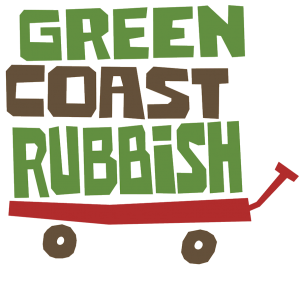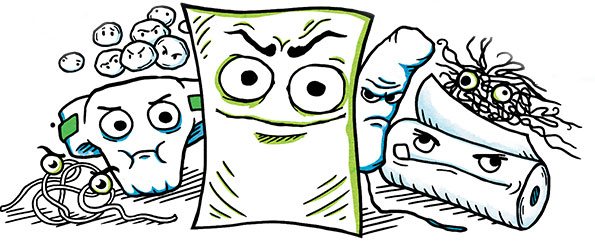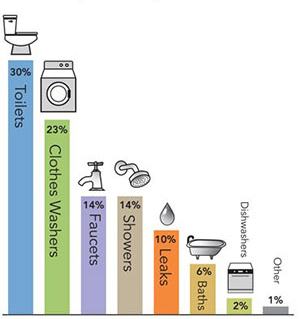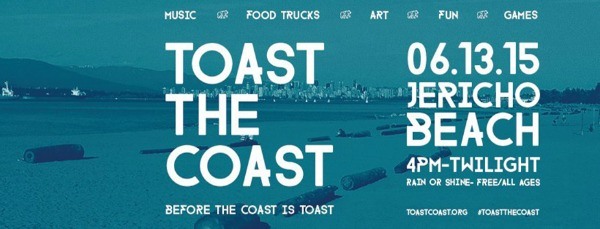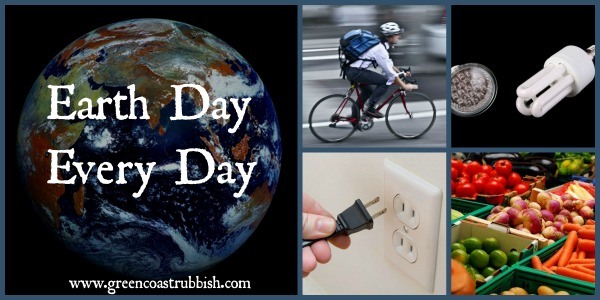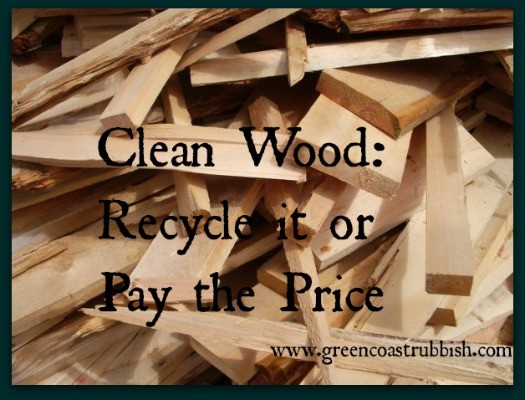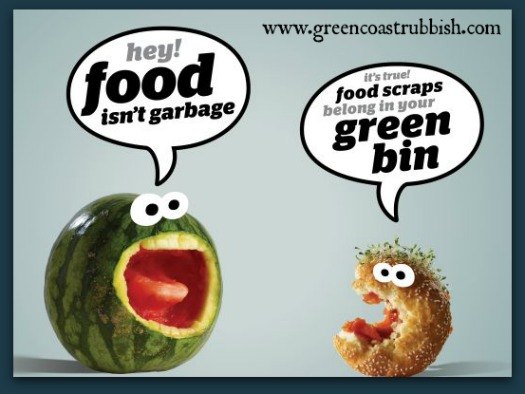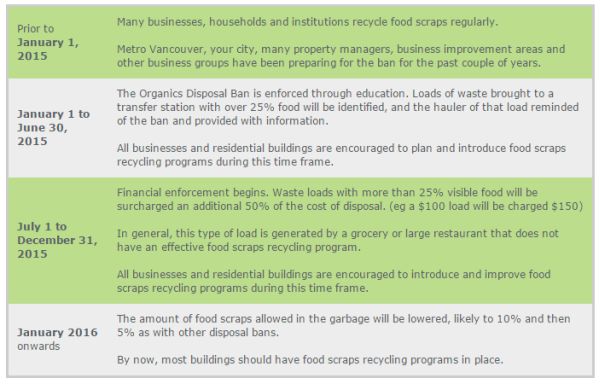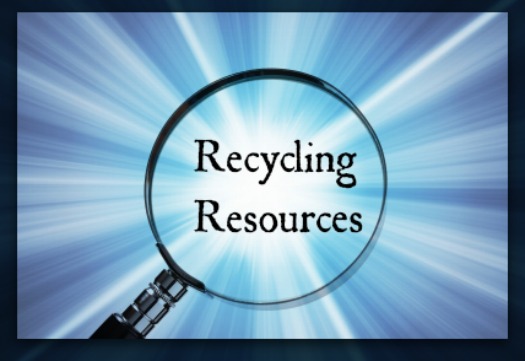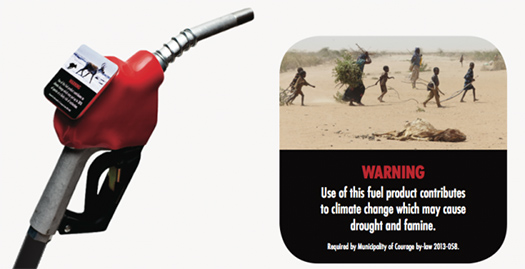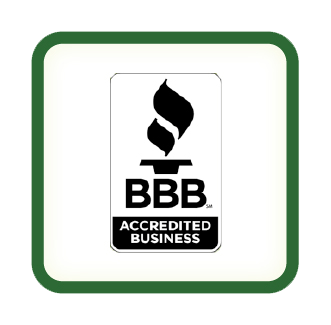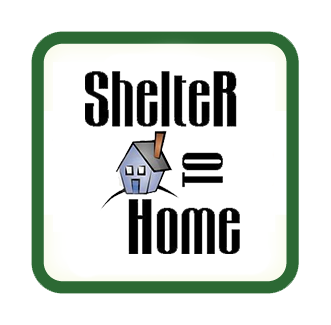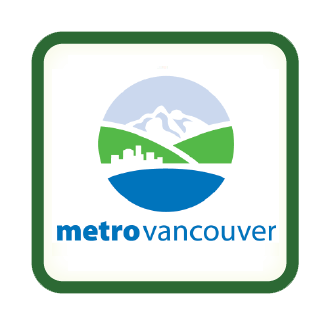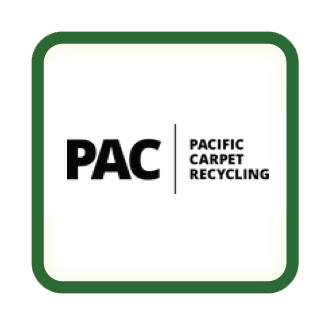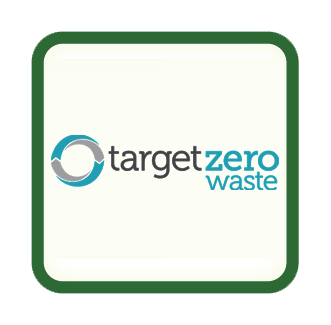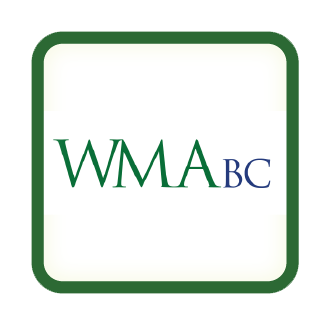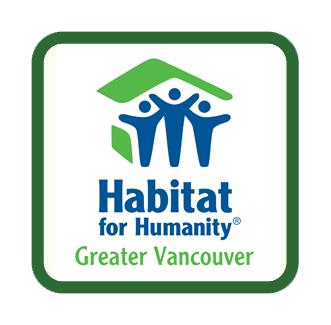Posts
Clean Wood: Recycle it or Pay the Price
/in composting, Organic Waste, Recycling, Renovation Waste/by Green Coast RubbishAs Metro Vancouver moves toward the goal of recycling 80% of the region’s waste by 2020, new rules are being implemented to divert green waste from the garbage including the organics disposal ban we talked about last week as well as a new clean wood disposal ban effective January 1, 2015.
What is Clean Wood?
For the purposes of the ban, clean wood includes solid wood, lumber and pallets that are unpainted, unstained, untreated and glue free. It’s okay if the wood contains nails, screws, staples or other metal fasteners.
Important Dates and Phases
The first 6 months of the ban -January 1 to June 30, 2015 – will focus on educating customers at all regional facilities including transfer stations and landfills about the clean wood disposal ban. As of July 1, 2015, loads of garbage containing over 10% clean wood will be subject to a 50% surcharge.
Recycle it or Pay the Price
You’ll save money and the environment by recycling clean wood:
1. Recycled clean wood can be used for composting, landscaping mulch or alternative industrial fuel.
2. The fee to recycle clean wood at a Metro Vancouver facility costs less than the garbage disposal fee, not to mention having to pay the price of the 50% surcharges as of July 1.
Why we Like It
Green Coast Rubbish is fully on board with the ban and is already recycling clean wood products as part of its every day operations. In 2013, Green Coast Rubbish composted 30.39 tonnes of clean wood and organic material.
Eamonn Duignan, President of Green Coast Rubbish explains, “It is encouraging to see clean wood being banned from Metro Vancouver facilities, especially when this material can be easily be composted or recycled. As material recovery options increase and become more economical viable within our region, we hope to see an outright ban of all wood products in the not so distant future.”
Who to Contact
For more information on the clean wood disposal ban, call the Recycling Council of BC’s Recycling Hotline at 604-RECYCLE (604-732-9253) or contact your local municipality.
Organics Disposal Ban Launches in Metro Vancouver
/in Commercial Rubbish Removal and Recycling, composting, Organic Waste, Recycling/by Green Coast RubbishRecycling food scraps is routine for many Metro Vancouver residents and businesses. However, the new organics disposal ban in effect as of January 1, 2015 now requires all households, businesses, and institutions to separate food waste from their garbage.
Why the ban? You may be surprised to learn that almost a third of the food we buy ends up in the garbage, amounting to 40% of residential garbage in the landfill. This slowly decaying food creates methane gas which is known to cause global warming.
While the majority of single family homes in Metro Vancouver are already recycling food and garden waste, the organics disposal ban will ensure that residential buildings (such as apartments and condos) are starting food scrap recycling programs if they haven’t already done so. Another major focus for the ban this year is to ensure that large restaurants and grocery stores are diverting organics from their garbage.
In summary, all residents, businesses and institutions are being asked to introduce food scraps recycling programs this year to meet the regional goals of recycling 70% of the waste in Metro Vancouver in 2015 and 80% by 2020.
Important Dates and Phases
The organics disposal ban is being introduced in stages over the coming months and includes an educational focus for the first 6 months, followed by the implementation of financial penalties in the latter half of 2015 as follows:
What Items are Banned?
Food scraps recycling programs should include the following items which are now banned from the garbage:
• Vegetables and fruits
• Raw food, plate scrapings, leftovers
• Packaged foods (remove packaging)
• Meats, fish, bones and seafood shells
• Pasta, bread and rice
• Dairy, eggshells, sauces, dressings
• Paper egg cartons
• Paper towels, unlined paper cups/plates
• Food-soiled napkins/pizza boxes/newspaper
• Kraft/paper bags used to collect food scraps
• Waxed cardboard boxes
• Coffee grounds/filters and tea bags
• Wooden utensils, chopsticks, stir sticks, and toothpicks
Resources
For more information on the organics disposal ban, check out the following links:
The Recycling Council of BC is available to answer questions and provides information on food scraps recycling programs and contacts for commercial and multi-family dwelling organics pick-up services. Call 604-RECYCLE (604-732-9253).
Metro Vancouver Organics Ban: Overview
Businesses: Q&A on Metro Vancouver’s Organics Disposal Ban
Restaurants : Tools and Resources, Case Studies, Frequently Asked Questions, Tips, Signage & Artwork
Grocers: Tools and Resources, Case Studies, Frequently Asked Questions, Tips, Signage & Artwork
Apartments & Condos: Tools and Resources, Case Studies, Frequently Asked Questions, Tips, Signage and Artwork
Residents: Tools and Resources, Case Studies, Frequently Asked Questions, Tips and Posters
Recycling Resources in Metro Vancouver and BC
/in Recycling/by Green Coast RubbishIt’s not unusual to feel a little like Sherlock Holmes when you are trying to figure out where in the world to recycle or dispose of your old stuff. You can use basic deductive reasoning and call your local municipality or recycling centre to try and get some answers. You can just pile up your old TV, propane cannisters, paint cans and other old stuff in the back of your garage in the hopes that it will magically disappear (or call Green Coast Rubbish to come and recycle it for you!). Or like Sherlock Holmes, you can do some “elementary” research using one of these great recycling resources to solve even the most puzzling recycling mysteries.
1. BC Recyclepedia Smart Phone App
We like this handy little app which offers recycling options throughout British Columbia for over 70 materials. Select the item(s) you want to recycle or dispose of from the pick list and you will receive a list of the 10 nearest depot’s and a Google map with directions. Download this free app onto your iPhone or Android device or view the same information on the Recyclepedia web page.
2. Metro Vancouver Recycles
Residents and businesses can visit the Metro Vancouver Recycles web page to find places to donate or recycle just about anything. You will be asked to select the material you wish to recycle or dispose of and provide your location information to get a list of suitable recycling options.
3. North Shore Recycling – Recycling Directory
If you live on the North Shore you are probably already familiar with North Shore Recycling; however their recycling directory is a great resource for all Metro Vancouver residents. This extensive directory describes where you can recycle your items as well as connecting you with detailed information on provincial stewardship programs and other resources.
4. Recycling Hotline
When all else fails and you can’t solve the mystery of where to take your items for recycling, the Recycling Council of British Columbia’s Recycling Hotline is the place to call. You’ll find an expert at the end of the line who will be able to do the detective work for any recycling or disposal mysteries you may be experiencing. Call 604-RECYCLE; 604-732-9253; or 1-800-667-4321 or email hotline@rcbc.ca.
5. Sell or Donate It
Sell or donate your reusable stuff to others using one of a variety of local websites such as:
- Habitat for Humanity Greater Vancouver
- Craigslist Vancouver
- Used Vancouver
- Helping Families in Need Society
- Kijiji Vancouver
No mystery here Watson. Just some good old fashioned detective work!
Our Horizon – Green Information at the Gas Pump
/in community/by Green Coast RubbishIt’s always inspiring to encounter passionate people who are trying to make a difference to the environment. It’s all the more impressive when they are setting an example at a young age.
Recently Emily Kelsall, a 16-year-old West Vancouver resident contacted us about a non-profit campaign she believes in called Our Horizon. This project is actively working toward changing the way that government and the general public think about fuel consumption by placing information graphics on fuel pumps. Similar to warning labels on cigarettes, they believe that adding this visual reminder to gas nozzles will help prompt consumers to be more mindful about the long term effects of fossil fuels on climate change.
Rob Shirkey, a former lawyer and the founder of the project, delivers an excellent TED talk on why this simple idea could have a lasting impact on the public. By inspiring individuals who care about the environment, Our Horizon also encourages people to speak to their local municipal officials to help make bigger changes in their communities and across the country. In the Lower Mainland, Emily has gotten a lot of support and media coverage. She has been featured in the Globe & Mail, and on Global TV, and the list of companies and individuals who endorse this idea keeps growing.
At Green Coast Rubbish, we regularly see how small changes in behavior can add up over time. Sometimes it can just take a little reminder to jog our brains into making better greener choices. We wish all the success to Emily and the Our Horizon project in getting these information labels at gas stations in Metro Vancouver in the near future!
Disposal Ban of Organics in Metro Vancouver
/in Commercial Rubbish Removal and Recycling, community, composting, Organic Waste/by Green Coast RubbishVancouver continues to move toward its goal of becoming the Greenest City by 2020. By imagining solutions and opportunities that can help residents and businesses to more effectively deal with household waste, they get closer every year. It’s estimated that nearly 35-40% of everything that we throw away is food waste; if diverted into a composting system, this adds up to a substantial amount kept out of our landfills. Which is why, starting in 2015, Metro Vancouver will be instating a ban on disposing organics and food waste into regular garbage bins.

There are huge community and environmental benefits to composting. As the food waste breaks down through natural processes, it can create valuable fertilizers that can help to enrich the soil with potassium, nitrogen, and phosphorus. It reduces overall greenhouse gas emissions and lengthens the life of our existing landfills, saving valuable space and local resources.
For some eye-opening stats on the amount of organic waste produced every day, as well for solutions on how to responsibly dispose of compastable waste visit our past blog Getting Serious About Organic Waste Reduction. If you are interested to learn more about the process that your organic waste goes through when it is processed you can check-out Part 2 of our Organic Waste Reduction blog.
Some things that can go into the compost bin:
- Fruit & vegetable scraps
- Eggshells, dairy
- Meat & fish bones
- Teabags
- Coffee filters & grounds
- Breads, pasta, rice
- Food soiled paper products (pizza boxes, napkins, cardboard egg cartons)
- Grass, leaves, weeds, plants
- Cooked food & grease
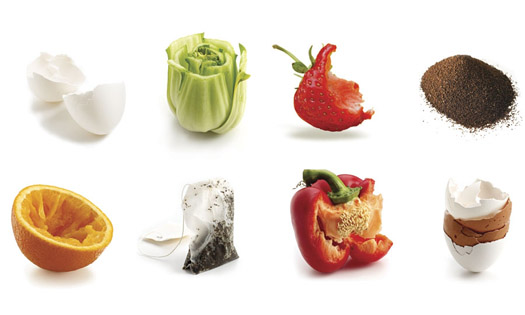
Some prohibited items:
- Any type of plastic (including compostable/biodegradable plastic bags)
- Rocks, soil
- Diapers
- Animal waste
- Wood products & lumber
- Branches bigger than 10 cm (4″) in diameter, and more than 0.5m (1.6ft) in length
These developments are very much in-line with the ideology of Green Coast Rubbish. We’ve seen the evidence firsthand of how much these compostable items can add up – in 2013 alone, we diverted 30.39 tonnes of organic material! By actively working together toward creating composting solutions with Metro Vancouver, we can all contribute to the success of this important program in our communities.
For more information about composting and the upcoming ban on organics, check out the Metro Vancouver website, and the City of Vancouver’s Green Bin Program.
